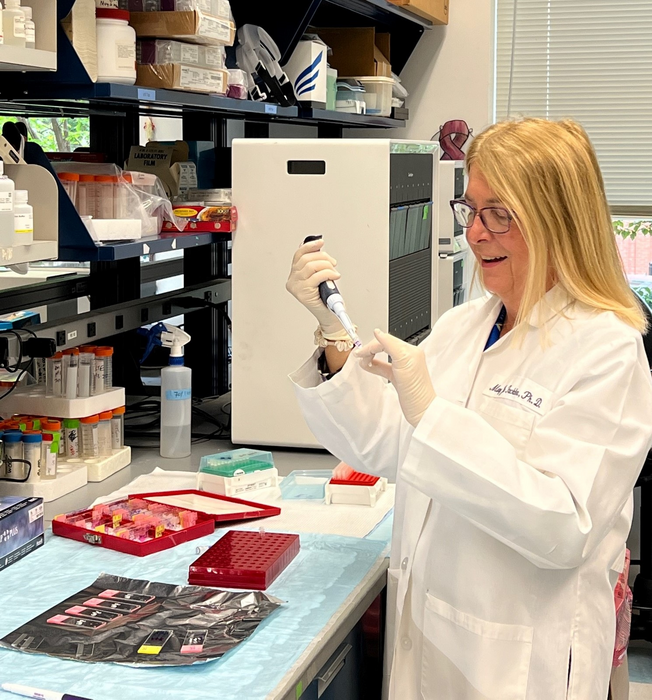A novel, automated liquid biopsy test in development by researchers at the Johns Hopkins Kimmel Cancer Center can accurately detect the presence of cancer DNA in the blood of patients with metastatic breast cancer within five hours. The test, currently a prototype for research use only, potentially could be used to quickly help oncologists determine if cancer treatments are working.

Credit: Peggy Li
A novel, automated liquid biopsy test in development by researchers at the Johns Hopkins Kimmel Cancer Center can accurately detect the presence of cancer DNA in the blood of patients with metastatic breast cancer within five hours. The test, currently a prototype for research use only, potentially could be used to quickly help oncologists determine if cancer treatments are working.
The test, called the Liquid Biopsy for Breast Cancer Methylation (LBx-BCM), is compatible with a commercially available molecular testing platform called GeneXpert® and can detect methylation, a type of chemical tag, in one or more of nine genes altered in breast cancers in 4.5 hours. It requires less than 15 minutes of hands-on time by a laboratory technician. A validation of the test and its potential uses was published online May 6 in the journal Cancer Research Communications.
Many patients with breast cancer do not respond to chemotherapy but go through multiple cycles of treatment before oncology teams can perform imaging studies to determine if a treatment is effective, explains senior study author Saraswati Sukumar, Ph.D., professor of oncology and pathology at the Johns Hopkins University School of Medicine. Imaging can be effective at detecting changes in larger tumors, but it is nearly impossible to identify changes in smaller tumors, Sukumar says.
“Our goal was to develop an assay that would be sophisticated yet simple to perform worldwide and could be used at the point of care to provide same-day feedback to clinicians and patients,” Sukumar says. “If we are able to show by this cartridge assay that we are indeed successful in predicting the course of treatment, we might be able to institute changes in the way we look at chemotherapy and the way we treat patients for metastatic breast cancer.”
With the LBx-BCM test, developed in collaboration with scientists at Cephied, a technician can place blood or plasma samples from cancer patients in tubes containing a reagent, a mixture used for extracting DNA, and place the contents in cartridges for the commercial system to chemically modify the DNA, and then amplify and detect methylated genes, returning results quickly. The assay looks for methylation markers (chemical alterations to DNA particular to cancer cells) among a panel of nine genes that recognize the four subtypes of breast cancer. The genes are AKR1B1, TM6SF1, ZNF671, TMEFF2, COL6A2, HIST1H3C, RASGRF2, HOXB4 and RASSF1.
The Johns Hopkins team previously developed a liquid biopsy laboratory assay called cMethDNA, which identified the presence of hypermethylation among 10 genes altered in breast cancers. Hypermethylation is a chemical alteration to DNA that often silences the function of genes that keep runaway cell growth in check. Its appearance in the DNA of breast cancer-related genes shed into the blood indicates that cancer has returned or spread. The test can detect up to 90% of patients with metastatic breast cancer and can help predict response to treatment and long-term patient outcomes. However, it takes 10 days to complete and requires a high degree of technical competence. LBx-BCM builds on this work, and because it is automated, takes much less time, says Mary Jo Fackler, Ph.D., the lead author on the study.
To test LBx-BCM, investigators first had two individuals run the test on separate days, using stored samples from 11 patients with metastatic breast cancer and four without breast cancer. Results were the same for more than 90% of the cases.
They also studied the test’s ability to detect metastatic breast cancer in two sets of samples from previous studies at Johns Hopkins. They examined cumulative methylation of the nine genes in 20 serum samples from patients with metastatic breast cancer and 20 from people without breast cancer. A second set of samples from 40 people with metastatic breast cancer, 17 with benign breast disease and nine without breast cancer, was analyzed. In both sets, LBx-BCM detected two- to 200-fold more methylated DNA in plasma samples from those with breast cancer than in normal or benign samples.
The test was found to correctly detect cancer 83% of the time, and correctly rule out cancer 92% of the time, for an overall diagnostic accuracy of 85%.
“Further prospective clinical trials will evaluate LBx-BCM’s detection sensitivity and its ability to monitor therapeutic response during treatment for advanced breast cancer,” Sukumar and colleagues wrote.
In addition to Sukumar and Fackler, other researchers were Claudia Mercado-Rodriguez, Leslie Cope, Bradley Downs, Abdul Hussain Vali, Jennifer Lehman, Rita Denbow, Jeffrey Reynolds, Morgan Buckley, Kala Viswanathan, Christopher Umbricht, Antonio Wolff and Vered Stearns of Johns Hopkins; Suzana Tulac, Neesha Venkatesan, Adam Aslam, Timothy de Guzman, Michael Bates, and Edwin Lai of Cepheid, Sunnyvale, California; and Wanjun Ding of Renmin Hospital of Wuhan University, China.
The work was supported by the Department of Defense (grant W81XWH-18-1-0018) and a research agreement from Cepheid.
Sukumar, Fackler and Wolff are inventors of the cMethDNA assay, U.S. patent US10450609B2, and also were awarded international patents filed through Johns Hopkins University.
Journal
Cancer Research Communications




